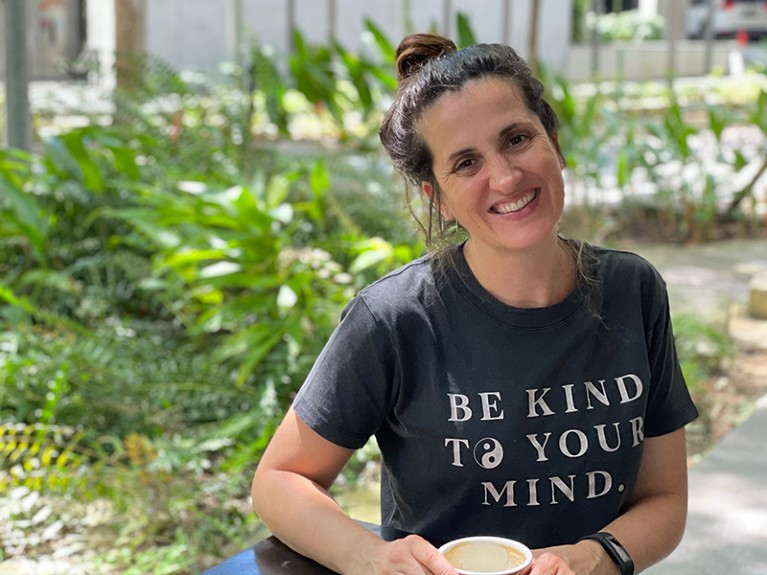Leaving academia and becoming an online entrepreneur ... - Nature.com

Anna Pineda runs an education business that helps scientists to be more productive and to improve their writing skills.Credit: Pilar Pineda
Today is the end of the financial quarter, and I'm at my home office processing invoices for my accountant. In a few weeks, I'll hear how much value-added tax I need to pay for my business activities.
Five years ago, I had no idea about any of this. I was a postdoctoral researcher at the Netherlands Institute of Ecology in Wageningen, pursuing a career path that ends with a professorship. I'd constantly be immersed in the struggles of data analysis, or anxiously awaiting a manuscript decision. Back then, I didn't look at the year in terms of financial quarters.
Now, I run an education business, 'I focus and write', helping other scientists to improve their productivity and writing skills.
It all started when I was failing to find a -tenure-track position. After wondering during my postdoctoral placement whether academia was really for me, I took a course to qualify as a yoga teacher. Afterwards, applying the mindful aspect of yoga to my writing helped me to finish an important paper, without my usual struggle with procrastination and thoughts of not being good enough. I was so excited about this new way of writing that I wanted every scientist to know about it.

The business of science
After designing a yoga and scientific writing course based on this approach, and teaching it at the University of Alicante in Spain, COVID-19 arrived and I could teach only online. So, I hired a business coach, who taught me the basis of online marketing and sales. Online-education businesses have a fairly low entry cost: you don't need to raise capital or have a complicated business plan. And although this change was not easy, I had a mission that was aligned more than ever with the needs of academics: to help scientists build a happier, more creative and productive academic life.
Having that mission has given me the strength to go through the ups and downs of being an entrepreneur. But I also benefit from privileges that not everyone has. For a start, my family's financial situation meant that I could let go of a salary and take risks. Second, having academic experience in prestigious institutions helped me to attract my first clients. Finally, I had support from mentors, family and friends, who reassured me along the way.
Entrepreneurship is hard, and many of the big struggles of working in academia are also present in running a business. Here's a summary of the good and not-so-good aspects of my role as an entrepreneur.
The good
Intellectual freedom and autonomy. Entrepreneurship gives me the freedom to create courses using whatever ideas I have to help other scientists. I can choose the direction of my business. For example, my first course merged scientific writing with yoga and meditation, a surprising combination for many early-career scientists. And my productivity course includes lessons on managing your energy and planning around the menstrual cycle, topics that are not common in courses about time management. Will people buy the courses or read the articles? That's where the challenge is.
Geographical freedom. I run an online business. My courses are a mix of pre-recorded videos, zoom calls and interactions with a community of students through the messenger channel Slack. I can do that from anywhere, as long as the Internet connection is good and time zones are not an issue. This opens up a range of possibilities. Working with people from all around the world, and having a job that I love, while living wherever works best for my family, is a great privilege.
Time freedom. I'm my own boss, so I decide how to spend my time. That doesn't mean I work less than when I did in academia. As a postdoc, I was working four days a week — a common schedule in the Netherlands, especially for those with young children. Now, I still work four days a week — and, as someone who teaches productivity, I try my best not to overwork.
The biggest difference is that I can arrange my schedule in whatever way suits me and my family best. That might mean I don't work on a Friday, because I'm helping with a child's classroom project, but then I'll spend Saturday morning writing and scheduling social-media posts. Still, I find the separation of work and personal life even more difficult than it was in academia.
Financial freedom. My salary doesn't depend on any university scale system without chances of negotiation. In theory, the sky is the limit. But in reality, the average salary of an entrepreneur working full time in the United States is about US$68,000 a year, which is similar to the average scientist's salary there. And this figure will vary depending on how many years of experience a person has: it won't be the true salary of many entrepreneurs who've just started their company.
Several other factors make an entrepreneur's salary highly variable. But as an indication, my first year in this role provided me with less than $1,000 per month, and I'm hoping to close my third year of business with the salary I had as a postdoc five years ago. At this point, I'm happy with that result. But I'm also aware that if the financial aspect had been my main goal for becoming an entrepreneur, I'd rather have searched for an alternative career.
The not-so-good
Having a good idea is not enough. As scientists, making an amazing discovery is not enough. We need to publish it and tell the whole scientific community about it. In business, we also need an idea that will provide a solution to a certain problem. Others must be willing to pay for that solution. And we need to have a way to reach those people, which I do mainly through social media, paid advertising and e-mail marketing. Without those assurances, a small business has only about a 50% chance of lasting five years, and a 33% chance of surviving long-term.
Uncertainty. The precarity of postdoctoral research careers is one of the main reasons why scientists leave academia. But as an entrepreneur, my salary depends on me generating revenue, and there is no certainty in that. Actually, the lack of revenue and cash is one of the main reasons why small businesses fail. My salary is about 50% of what I make. The rest goes on expenses and taxes. When people think about starting a business, they often don't realize all the expenses that are involved. But to scale up and professionalize an online business, investments and risks are also necessary. That's why most business experts recommend starting this career path as a side job, or having a cash reserve equivalent to 12 months of living expenses.
Impostor syndrome. This feeling of self-doubt is just as much in my career now as it was when I was an academic. Impostor syndrome tends to become especially apparent when people do something new and expand their comfort zone. Two years ago, I wrote a column about meditation for Nature Careers. For weeks, I feared that I'd be discovered as a fraud for talking about meditation, and that I'd receive abuse on Twitter. My impostor syndrome popped up before pretty much every webinar and workshop. And I know that it will pop up again soon. But now I have some strategies for not letting those feelings hold me back. For example, I practise meditation, keep a folder with encouraging e-mails from my clients and go to therapy.
Entrepreneurship is not for everyone. But today, I celebrate it: for the freedom that it has brought to my life, for the people that I have the joy to work with daily, and for the future full of possibilities that lies ahead of me. And I equally celebrate the years when I worked as a PhD student and then as a postdoc. Without the experience, challenges and people that were part of my academic life, 'I focus and write' would not exist.



Comments
Post a Comment